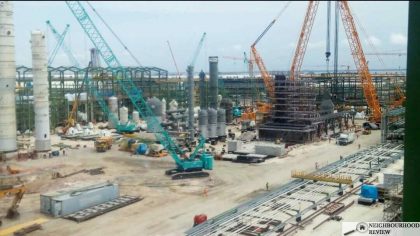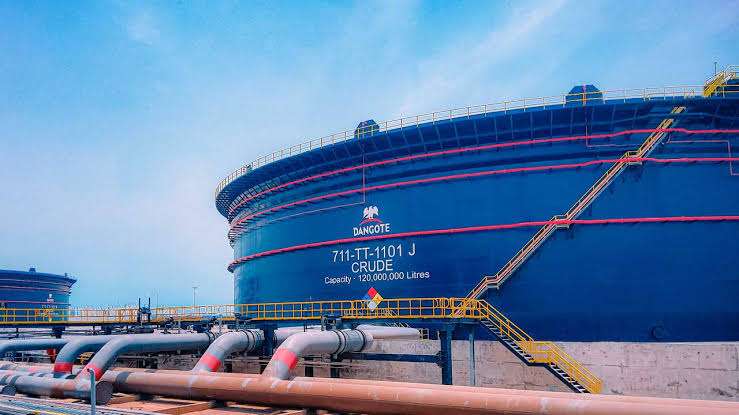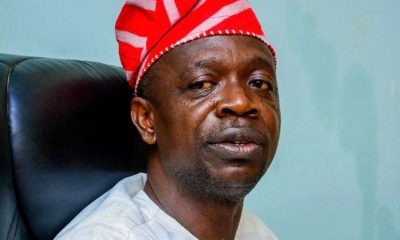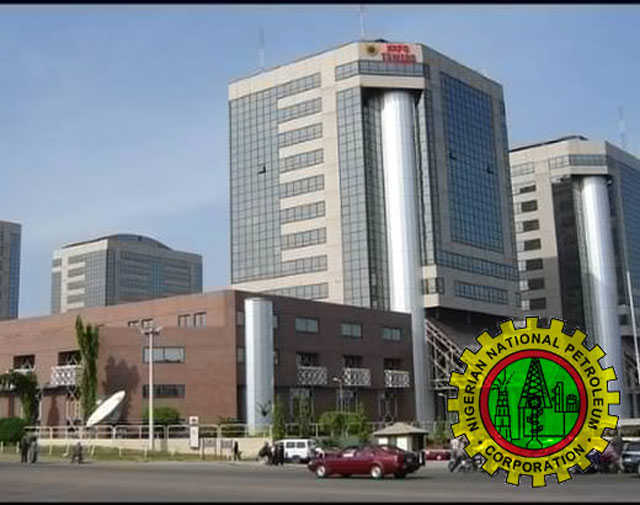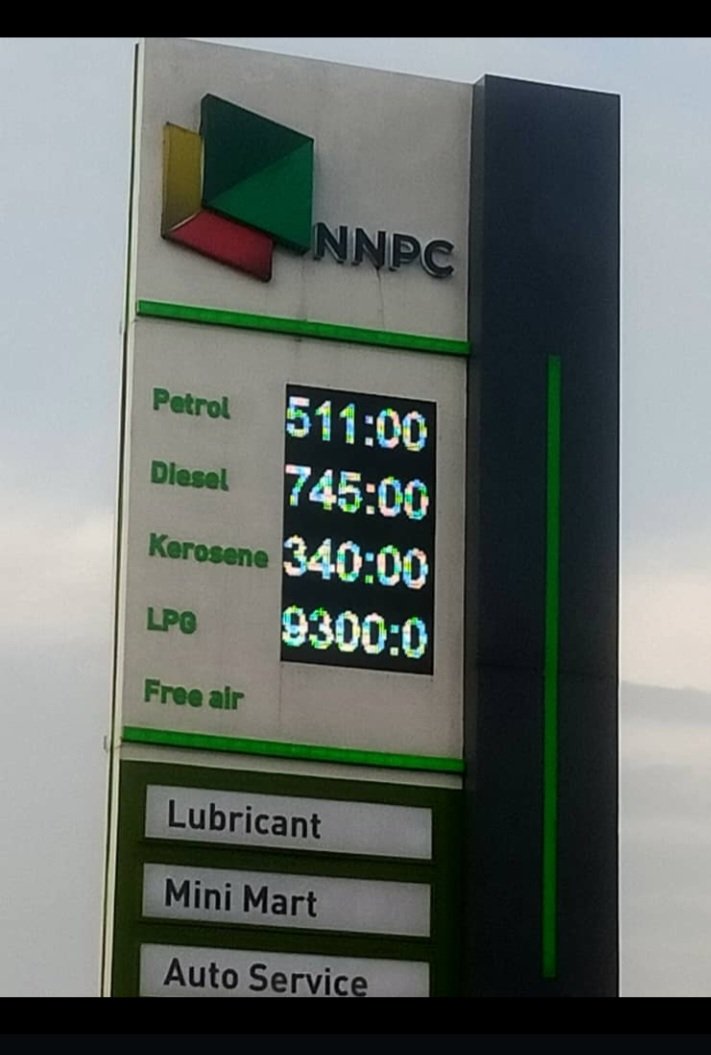Business
Fuel subsidy Impasse: Dangote Refinery to the Rescue

By AYOOLA OLAOLUWA
Barely eight months to the February 16, 2019 election President Muhammadu Buhari and leaders of the All Progressives Congress (APC) are facing a big dilemma. The administration, it was learnt, is torn between increasing the fuel price and subsidising it to maintain the N145 per litre price, despite the current crude oil price of over $75 per barrel.
Sources in the oil industry informed Business Hallmark that the current administration had made several unsuccessful attempts to ramp up production from Nigeria’s four public-owned refineries at Port Harcourt, Warri and Kaduna in an effort to end the unending fuel subsidy, scarcity and price hike. The government, they said, has run out of options on how to solve the fuel importation and subsidy embarrassment.
According to the Nigerian National Petroleum Corporation (NNPC), the landing cost of petrol currently as at May 31, 2018, stood at about N171 per litre. That is N26 per litre above the selling price of N145 per litre. This makes the current price unsustainable.
Nigeria spent about N1.2 trillion last year on subsidy in 2017 and projects a reduction to about N750 billion this year. However, the spike in oil price in the international market as high as $80 per barrel and the dashed hope of improved performance of local refineries has put the estimate in jeopardy.
According to the National Bureau of Statistics (NBS), Nigeria spent N2.59 trillion to import refined petroleum products in 2016. Experts concluded that the 2017 and 2018 spending is expected to double due to the rising price of crude oil in the international market.
But fearing a backlash from angry Nigerians who are already weighed down by his economic policies against another hike in fuel price, top officials in the Buhari administration are said to be opposed to demands by some technocrats in his government to end subsidy due to its un-sustainability.
“Yes, there are pressures on the president to increase the price of petrol from the current price of N145. Even the NNPC management is in support of the increment. But the politicians, true to their nature of running away from any policy that might affect their political fortunes, have been able to convince the president that any increase in the price of fuel now to match the importation cost less than eight months to the 2019 general elections, where the president would be seeking a re-election, is almost akin to a political suicide”, said a source in the petroleum ministry who did not want his identity disclosed.
Also the president is a pro-people man and adamant on any policy that may have spiral price effect on the economy and condition of the people. Sources hinted the he believes the money belongs to Nigerians and subsidy is a way of giving back to the people instead of allowing only the elite to consume the national wealth.
He also disclosed that the government, rather than hiking the cost of petrol, is patiently waiting for the commencement of operation of the Dangote Refinery and Petrochemical Company in December 2018. To complement the expected yield from Dangote Refinery, the Federal Government also approved the construction of 25 modular refineries. The combined capacity of the 25 refineries stands at approximately 1.6 million bpd.
While three of the licensed companies are billed to construct conventional stick-build plants with capacity estimated at over 850,000 bpd, 22 licenses are to construct modular units estimated at about 700,000 bpd in combined capacity.
Checks, however revealed that the Federal Government might soon heave a huge sigh of relief with the expected delivery of Dangote Refinery in early 2019.
The refinery, owned by Alhaji Aliko Dangote, is the largest single train petroleum refinery in the world with a production capacity of about 650,000 barrels per day (bpd). When completed, the refinery is expected to solve the nation’s dependent on fuel importation, subsidy and price hike. It will also have spare volume for export to other countries.
“This is the biggest industrial site anywhere in the world from the fertiliser, petrochemical and refinery plants. The Dangote Refinery will produce 650,000 barrels per day of refined petroleum products to meet all the country’s refined petroleum products needs as well as export to other countries.
“Our refinery will be 1.5 times the capacity of all the existing four refineries in the country even if they are working at 100 per cent capacity. This is the single largest refinery in the world. The petrochemical that we have is 13 times bigger than the Eleme Petrochemical built by government,” said the promoter of the ambitions project.
The refinery, which is located in Lekki Free Trade Zone on a vast land mass of 2,200 hectares, an area eight times bigger than the entire Victoria Island in Lagos, is an integrated petro chemical complex. Apart from refining crude oil to petroleum products, it will also have petrochemical and fertiliser plants.
The petrochemical plant would process 1.3 million metric tonnes per annum of petrochemical products. The fertiliser plant will produce 2.8 million metric tonnes of assorted fertiliser, while the gas plant will produce three million cubic metres of gas per annum.
The refinery will also have the largest sub-sea pipeline infrastructure in the world with capacity to handle three billion cubic metres of oil annually.
The refinery project, according to Dangote, apart from crashing the price of petrol products in Nigeria, would save the country about $7.5 billion annually in foreign exchange being used to import petroleum products and also generate $5 billion foreign exchange earnings annually.
The plant, according to him, will create over 100,000 employment opportunities and revive over 11,000 filling stations that had been shut due to shortage of products.
BH findings however revealed that Dangote’s confidence of meeting the nation’s refined petroleum need, based on the implausible current consumption rate of over sixty million litres per day, may be far-fetched.
Dangote, BH gathered, had made the assumption on the earlier figures of between 30 and 35 million litres of petrol daily consumption by the Minister of State for petroleum, Ibe Kachukwu.
But the Group Managing Director of the NNPC, Engineer Maikanti Baru, had in May blamed the high value of the under recovery to rising fuel consumption which it attributed to massive smuggling of petroleum products to neighbouring countries.
He insisted that the activities of the smugglers had led to recent observed abnormal surge in the evacuation of petrol from less than 35 million litres per day to more than 60 million litres per day, which was in sharp contrast to established national consumption pattern.
With this new figure, it seems unlikely that the much expected end to fuel importation with the coming on board of Dangote Refinery will soon manifest.
According to experts, to achieve the feat, more refineries must come on board, while the four state-owned refineries must also produce at over 80percent capacity.
“I doubt this new figure of 60 million litres of petrol consumed per day, it is quite incredible. Who are those consuming it? The population of the whole of West Africa is just a little over that of Nigeria. So where is the fuel going to?
“However, if we are to act on the new figure of 60 million, the end to fuel importation and its attendant problems is far from over,” said Dr. Godsday Emetitiri, a lecturer at the Petroleum Training Institute, Effurun in Delta State.
Investigation by BH shows that NNPC’s assertion of Nigeria’s daily consumption of 60 litres is dubious. The GMD of the corporation had blamed the upsurge to smuggling to neighouring countries of Cameroun, Benin, Niger and Chad, Togo and Ghana.
However, the current population of the whole of West Africa is 381,390,050 (381.3milion) as of Thursday, June 14, 2018, based on the latest United Nations estimates.
The combined population of the Nigeria’s neighouring countries blamed for the problem is just 106, 218, 845. Ghana topped the list with the population of 29,463,643 people, followed by Cameroun 24,641,570; Niger 22,311,375; Chad 15,325,653; Benin 11,485,674 and Togo 7,990,926, totaling 106, 218, 845 million people.
To further discredit Baru’s claim, Chad, Niger and Cameroun are oil producing countries and they largely meet their domestic needs of refined petroleum products through functioning refineries.
While Chad produces260,000 barrels of crude oil per day from the Mangara and Badila oilfields, which are operated by Glencore Xstrata, and another field managed by a subsidiary of China National Petroleum Corporation (CNPC), Niger Republic produces 80,000 bpd with the country’s refinery consuming 20,000 bpd, while the remaining 60,000 bpd is exported to Cameroun and Chad.
Niger had in November 2011 inaugurated the 20,000 barrel-per-day Soraz refinery near Zinder, very close to the Nigerian border. The refinery is 60 per cent-owned by Chinese state oil company, CNPC and 40 per cent by Niger Republic.
Cameroun on the other hand, though produces crude of its own, still imports crude from abroad which it refines at the state-owned National Refining Company (SONARA).
Since it officially kicked off production in 1981, SONARA has been supplying the market petroleum products namely butane, gasoline, jet fuel, kerosene, fuel oil and distillate.
The country’s lone oil refinery has the capacity to refine 2.1 million tons per year and there is an ongoing upgrade to push it to 3.5 million tons per annum, with the ultimate goal of diversifying production in a bid to satisfy national and sub-regional demand.
The upgrade will also enable Cameroon to process the heavy crude that it produces, not just light grades that it imports.
Nigeria with large crude oil reserves and the largest crude oil producer and exporter in Africa and eighth in the world, still imports more than 80 per cent of its petroleum product needs.
Nigeria’s per capita refining capacity is 0.002 bpd, low even by Africa standards. Libya by comparison is 0.06 bpd/capita, and South Africa 0.01 bpd/capita.
The Port Harcourt Refinery has capacity to produce 10.500 million metric tonnes per year of refined products. The Kaduna Refinery, built in 1980, has capacity to produce 5.5 million mt/yr (110,000 b/d), while Warri Refinery, built in 1978, has capacity to produce 6.2 million mt/yr (125,000b/d) of refined products.
However, all the refineries operate below 20 percent capacity. The three refineries currently produce petroleum products load out between 2 to 4million litres of PMS daily and about the same quantity of AGO daily.
It would be recalled that Minister of State for Petroleum resources, Dr. Ibe Kachikwu, during a visit to the Dangote petrochemical refinery last year had implored Dangote to expedite action on the refinery in order to meet its 2019 completion date.
Kachikwu’s plea, an industry expert, Mr. Tayo Atanpaku, said is a confirmation of the federal government’s acceptance of defeat.
“The federal government had on several occasions openly agreed that it is beyond its ability to make its refineries work by appealing to Dangote to quickly come to its rescue. Nigerians will have to wait for Dangote refinery to come on stream to stop importation of petroleum products; this is sad”, Atanpaku said.




